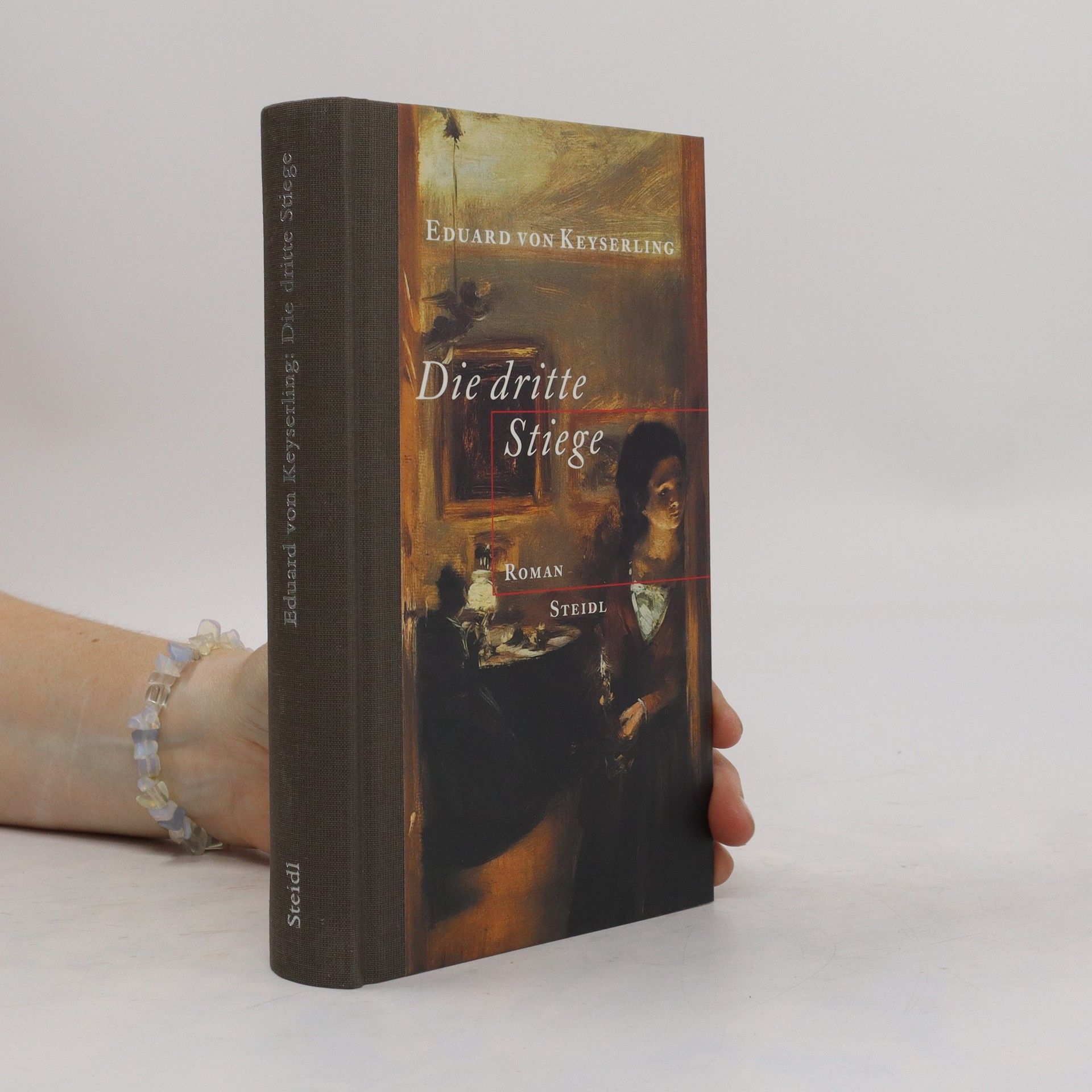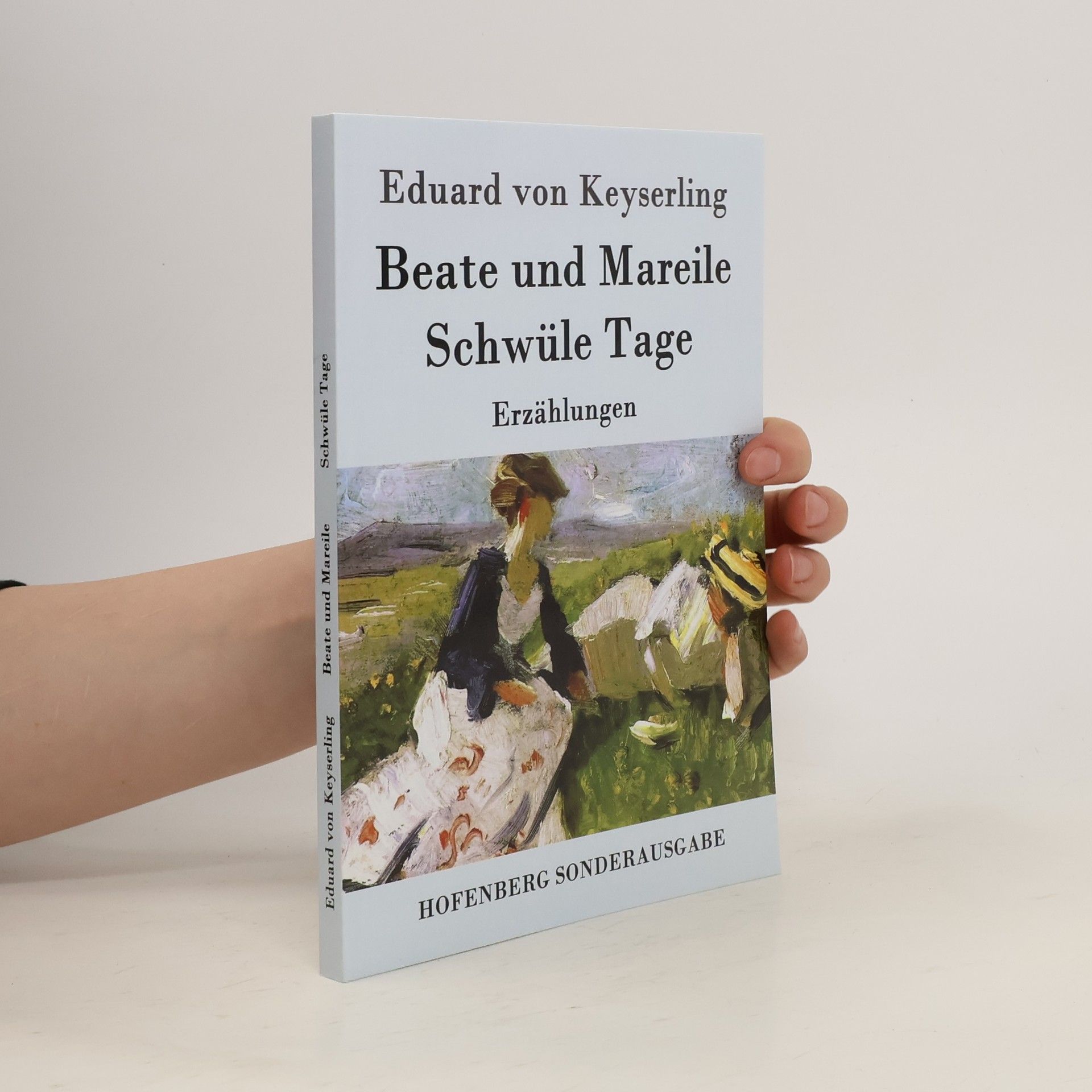Eduard von Keyserling: Die dritte Stiege. RomanLesefreundlicher Großdruck in 16-pt-SchriftGroßformat, 210 x 297 mmBerliner Ausgabe, 2023Durchgesehener Neusatz mit einer Biografie des Autors bearbeitet und eingerichtet von Theodor BorkenErstdruck Verlag von Wilhelm Friedrich, Leipzig, 1892.Umschlagabbildung: Gustave Caillebotte, Ein Mann am Schreibtisch, 1885Gesetzt aus der Minion Pro, 16 pt.Henricus - Edition Deutsche Klassik GmbHÜber den Autor:1855 im kurländischen Tels-Paddern - heute in Lettland - als zehntes von zwölf Kindern in eine baltische Landadelsfamilie hineingeboren, studiert Eduard von Keyserling zunächst Jura in Dorpat (heute Tartu in Estland) und wechselt nach einem nie aufgeklärten Eklat und seinem Ausschluss aus der studentischen Verbindung »Curonia« nach Wien, wo er sich für Philosophie und Kunstgeschichte einschreibt und für die Wiener Allgemeine Zeitung schreibt. Zurück in Kurland widmet er sich der Verwaltung der mütterlichen Güter. Als Ende 1894 die Mutter stirbt, zieht er mit drei seiner Schwestern nach München. Der an Syphilis Erkrankte erblindet und lebt zurückgezogen in einem Haushalt mit seinen Schwestern, denen er seine Werke diktiert. Seine einfühlsame Schilderung erotischer Konflikte und die feine Ironie seiner oft adligen Figuren bringen ihm den Beinamen der »baltische Fontane« ein. Am 28. September 1918 stirbt mit Eduard von Keyserling ein bedeutender Virtuose der impressionistischen Erzählung.
Eduard von Keyserling Book order (chronological)
Eduard Graf von Keyserling was a Baltic German fiction writer and dramatist, an exponent of literary Impressionism. After initial influences of Naturalism, his later work, particularly novellas and novels after 1902, placed him at the forefront of German literary Impressionism. Keyserling was a subtle and elegant stylist, whose prose is unforgettable for its evocative ambience and 'feel'. His work shares a certain pessimistic kinship with authors like Ivan Turgenev and Anton Chekhov.






Eduard von Keyserling präsentiert in dieser Sammlung zwei Erzählungen, die in lesefreundlichem Großdruck und im Großformat aufbereitet sind. Die erste Erzählung, "Beate und Mareile", wurde 1903 veröffentlicht, gefolgt von "Schwüle Tage", die 1904 in der Neuen deutschen Rundschau erschien. Die Textgrundlage stammt aus den gesammelten Erzählungen von 1922. Die Umschlagabbildung zeigt Franz Marcs "Zwei Frauen auf einem Hügel" aus dem Jahr 1906. Keyserling, 1855 in eine baltische Landadelsfamilie geboren, studierte zunächst Jura, bevor er nach Wien wechselte, wo er sich für Philosophie und Kunstgeschichte interessierte. Nach dem Tod seiner Mutter im Jahr 1894 zog er mit seinen Schwestern nach München. Trotz seiner Erkrankung an Syphilis und der damit verbundenen Erblindung diktierte er seine Werke. Seine einfühlsamen Darstellungen erotischer Konflikte und die feine Ironie seiner oft adligen Charaktere brachten ihm den Beinamen "baltischer Fontane" ein. Am 28. September 1918 verstarb Keyserling, ein bedeutender Virtuose der impressionistischen Erzählung.
Eduard von Keyserling präsentiert in dieser Sammlung sechzehn Erzählungen, die sich mit den Themen Liebe und Leben auseinandersetzen. Die Geschichten umfassen verschiedene Aspekte menschlicher Beziehungen und Emotionen, von der Sehnsucht bis zu den Herausforderungen des Lebens. Die Erzählungen sind in einer neuen Ausgabe, herausgegeben von Karl-Maria Guth, die an die aktuelle deutsche Rechtschreibung angepasst wurde. Eduard von Keyserling wurde 1855 in eine baltische Landadelsfamilie geboren und studierte zunächst Jura, bevor er sich der Philosophie und Kunstgeschichte zuwandte. Nach dem Tod seiner Mutter zog er mit seinen Schwestern nach München, wo er aufgrund seiner Krankheit zurückgezogen lebte. Trotz seiner persönlichen Herausforderungen hinterließ er ein bemerkenswertes literarisches Werk, das für seine einfühlsame Darstellung erotischer Konflikte und die feine Ironie seiner Figuren bekannt ist. Keyserling wird oft als der „baltische Fontane“ bezeichnet und gilt als bedeutender Virtuose der impressionistischen Erzählung. Er starb am 28. September 1918 und hinterließ ein Erbe, das weiterhin Leser fasziniert.
Auf dem Landgut Kadullen gibt sich eine kleine aristokratische Hausgesellschaft dem sommerlichen M iggang hin. Billy, die siebzehnj hrige Tochter des Grafen Hamilkar von Wandl-Dux, verliebt sich dabei in ihren leidenschaftlich-sentimentalen polnischen Vetter Boris Dangell . Einen Heiratsantrag des Vetters lehnt der Graf zwar kategorisch ab, doch seine Tochter erliegt der Versuchung und l t sich zu einer n chtlichen Flucht berreden. Der romantische Zauber verfliegt freilich binnen Stunden, die ungewohnte und rauhe Wirklichkeit nimmt bedrohliche Z ge an, und die entflohene Komtesse, welche die Tragweite ihrer Tat gar nicht zu erfassen vermag, steht urpl tzlich vor folgenschweren Entscheidungen.
Eduard von Keyserling: Am Sudhang. Erzahlung Erstdruck 1914 Vollstandige Neuausgabe mit einer Biographie des Autors. Herausgegeben von Karl-Maria Guth. Berlin 2015. Umschlaggestaltung von Thomas Schultz-Overhage unter Verwendung des Bildes: Ivan Kramskoy, Untrostlich, 1884. Gesetzt aus Minion Pro, 11 pt."
Eduard von Keyserling stammte aus dem baltischen Adel, dessen überkommenen Standesregeln und Ehrbegriffe er in seinen Erzählungen immer wieder aufgriff. »Wellen«, scheinbar eine harmlose Sommeridylle in einem Badeort an der Ostsee, schildert die Auseinandersetzungen der in ihrem Standesdünkel erstarrten Badegäste. Ebenfalls um einen Verstoß gegen die Standesregeln geht es in »Schwüle Tage«, als der junge Bill bei einem Ferienaufenthalt auf dem Landsitz der Familie Warnow ein unstatthaftes Liebesverhältnis seines Vaters entdeckt.
Kostbarkeiten des Lebens - Gesammelte Feuilletons und Prosa
Schwabinger Ausgabe, Band 3. Mit einem Nachwort von Lothar Müller
Er schrieb über die Unentbehrlichkeit der Kultur, himmlische und irdische Liebe, Interieurs, grossen Stil und die Kostbarkeiten des Lebens. Er ergründete die Kunst des Traums, dramatisches und episches Sterben, die Lichtmalereien der Avantgarde und die Psychologie des Komforts. Aus seinen Kunstkritiken, Feuilletons und Briefen spricht ein Mensch von hoher Bildung und Sinnesart. Eduard von Keyserling ist als Feuilletonist und Kritiker nicht so bekannt, wie er es verdient. Der Band bietet die Möglichkeit, ihn als vielseitig interessierten Kunst- und Literaturliebhaber zu entdecken. In seinen nichtliterarischen Prosatexten spiegeln sich die Dekors der Prinzregentenzeit und das bunte Geistes- und Kulturleben um 1900 wider. Ob er die Goldgeschmeide Carl Strathmanns oder die Farbenspiele des frühen Kandinsky würdigt, Keyserlings ästhetisches Sensorium für die Modernen steht dem für die alten Meister in nichts nach. Die Kritiken zielen über das Ästhetische hinaus ins Seelenkundliche und Politische. Sie zeichnen die geistige Physiognomik einer bewegten Epoche. Neben den Feuilletons enthält der Band fünf verschollene Erzählungen, ein umfassendes Korpus an Briefen sowie die erste ausführliche Chronik zu Leben und Werk. Dank der Fülle an Selbst- und Fremdzeugnissen wird der Schriftsteller auch als Privat- und Gesellschaftsmensch greifbar.
Eduard von Keyserling: Am Südhang. Eine Erzählung Lesefreundlicher Großdruck in 16-pt-Schrift Großformat, 210 x 297 mm Berliner Ausgabe, 2020 Durchgesehener Neusatz mit einer Biographie des Autors bearbeitet und eingerichtet von Theodor Borken Erstdruck 1914. Umschlaggestaltung von Thomas Schultz-Overhage unter Verwendung des Bildes: Ivan Kramskoy, Untröstlich, 1884. Gesetzt aus der Minion Pro, 16 pt. Henricus Edition Deutsche Klassik UG (haftungsbeschränkt)
Die Sammlung präsentiert die eindrucksvollsten Novellen von Eduard von Keyserling, einem Meister des Impressionismus. In Geschichten wie "Schwüle Tage" und "Am Südhang" entfaltet sich eine Welt voller lebendiger Bilder und emotionaler Tiefe. Keyserling gelingt es, durch subtile Beobachtungen und atmosphärische Beschreibungen das Alltagsleben und die Beziehungen seiner Charaktere eindrucksvoll darzustellen. Die Erzählungen laden den Leser ein, in eine facettenreiche und poetische Realität einzutauchen.
Kaum je wurde der Beginn des Ersten Weltkriegs, die zerbrechliche ländliche Idylle im Sommer 1914 so beiläufig und doch so eindringlich geschildert wie in den beiden meisterlichen Novellen Eduard von Keyserlings »Im stillen Winkel« und »Nicky«.